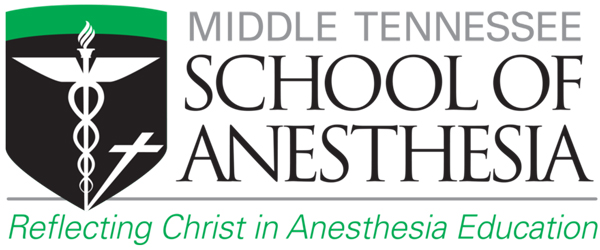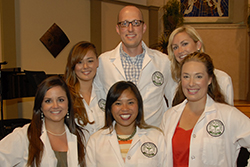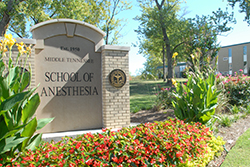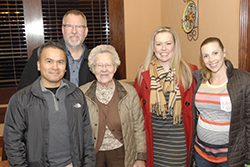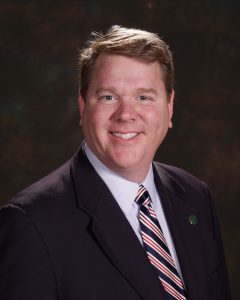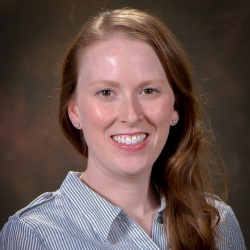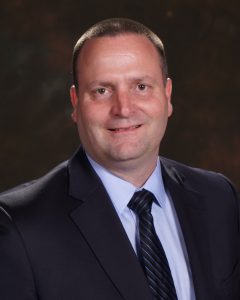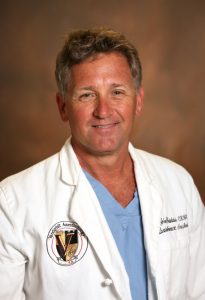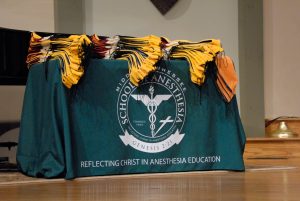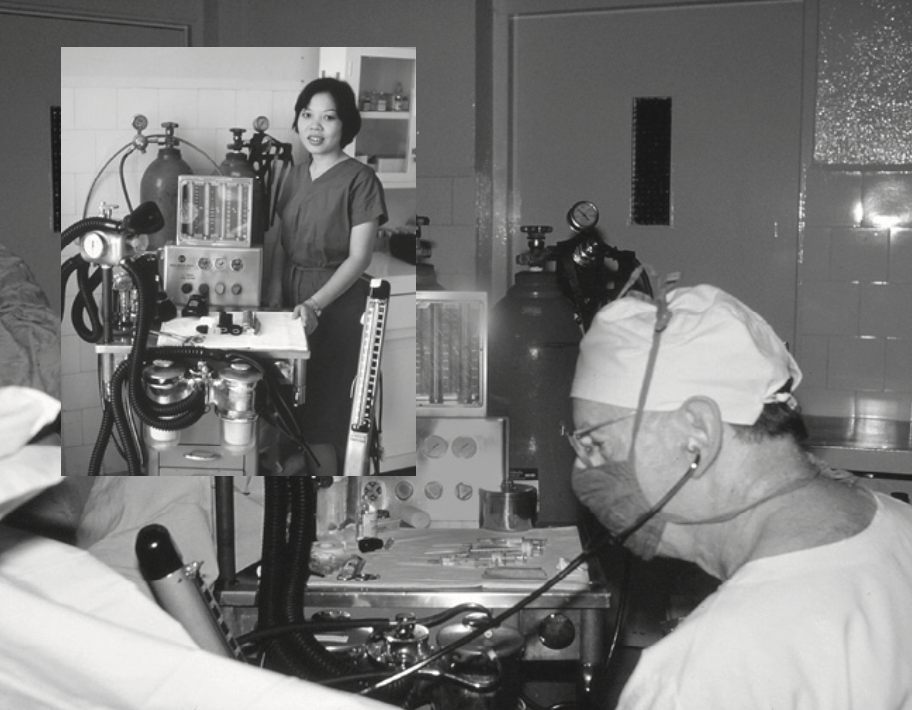Airways
July – September 2020
Service in Action: MTSA student Emily Colwell leads COVID relief effort
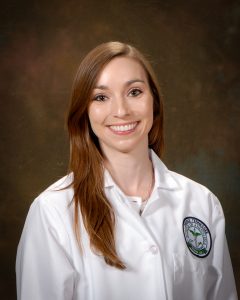 During the COVID-19 outbreak, MTSA senior Emily Colwell, SRNA (Class of 2020, right), recognized a need within Nashville’s healthcare community that had not been addressed—providing care for those on the frontlines of the crisis. So she jumped into action.
During the COVID-19 outbreak, MTSA senior Emily Colwell, SRNA (Class of 2020, right), recognized a need within Nashville’s healthcare community that had not been addressed—providing care for those on the frontlines of the crisis. So she jumped into action.
ABOVE PHOTO: As part of the School’s Mission Initiative, MTSA donated $5,000 to the Frontline Foods effort, which provided 350 meals to hospital units throughout Nashville.
“Many of my ICU nurse friends—several in New York and California—were working in warlike conditions. The accounts of their experiences were chilling,” Colwell said. “Because I wasn’t actively working as a nurse, I felt that I couldn’t do anything to help. But after some research, I found Frontline Foods, which is leading the effort to feed hospital staff and provide some relief during this time of immense stress and pressure.”
The Frontline Foods coalition is a grassroots national movement that coordinates with hospitals and restaurants to identify the needs of the healthcare community and then facilitates the delivery of meals to hospitals and other facilities.
Seeing there was no local chapter in Nashville, Colwell took the initiative to contact the national organization and offer to start one. She quickly became acquainted with the organization’s founder and helped launch the Nashville chapter of Frontline Foods in a matter of days.
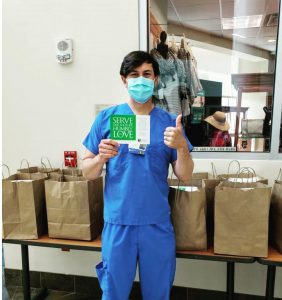 “I initially brought the idea of connecting MTSA to this effort to [Assistant Program Administrator] Leigh Taylor, my mentor and a professor in several of my classes. She has always been very supportive, and she was onboard from the start and asked what she could do to help. I also contacted [MTSA President] Dr. Hulin, and he immediately agreed that MTSA should be involved,” Colwell said.
“I initially brought the idea of connecting MTSA to this effort to [Assistant Program Administrator] Leigh Taylor, my mentor and a professor in several of my classes. She has always been very supportive, and she was onboard from the start and asked what she could do to help. I also contacted [MTSA President] Dr. Hulin, and he immediately agreed that MTSA should be involved,” Colwell said.
Colwell hit the ground running, contacting local hospital units as well as administrators. She and the team also identified independently owned restaurants in the community that needed help staying afloat.
“Having worked at Vanderbilt in the past and completed clinical rotations at many other hospitals in Nashville, I was able to quickly make inroads and find out who would be best served. After onboarding several restaurants, obtaining hospital approvals, and receiving sufficient funds via donations, we started the food deliveries,” Colwell said.
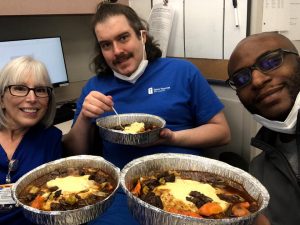 MTSA donated $5,000 to the effort, which provided 350 meals to hospital units throughout Nashville. Funds came from net proceeds of the Mission & Awards Gala and Golf Classic events. These two donor-supported community events fund MTSA mission initiatives both locally and abroad.
MTSA donated $5,000 to the effort, which provided 350 meals to hospital units throughout Nashville. Funds came from net proceeds of the Mission & Awards Gala and Golf Classic events. These two donor-supported community events fund MTSA mission initiatives both locally and abroad.
Hospitals that received meals included:
- Ascension Saint Thomas West Hospital
- Ascension Saint Thomas Midtown Hospital
- Nashville General Hospital
- Northcrest Medical Center
- Sumner Regional Medical Center
- Tristar Centennial Medical Center
- Vanderbilt University Medical Center
In addition, Colwell and the Frontline Foods team observed a need in other high-stress areas, such as rehabilitation and hospice facilities. So they also were able to serve Alive Hospice, Diversicare, Encompass Health Rehabilitation Facility and Vanderbilt Stallworth Rehabilitation Facility.
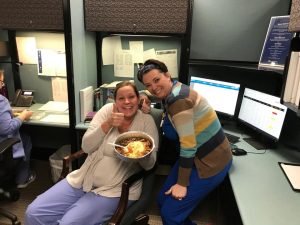 “MTSA was the first large donor that stepped up in the community, which really helped jump start our efforts and shine a light on our mission,” Colwell said. “In addition, the School was able to secure a commitment from the local Coca-Cola distributor which provided drinks with the meals.
“MTSA was the first large donor that stepped up in the community, which really helped jump start our efforts and shine a light on our mission,” Colwell said. “In addition, the School was able to secure a commitment from the local Coca-Cola distributor which provided drinks with the meals.
“Everyone who received meals was so appreciative. Over and over again, they would thank us for supporting them. The level of appreciation we saw reminded me just how important this effort is. I remember when I was a nurse or even as an SRNA in clinicals, getting a free meal—not having to worry about my lunch for the day—is a huge relief,” Colwell added.
She said one of the reasons she chose to attend MTSA is the School’s focus on a life of service, which aligned with her upbringing: “My mother raised me to focus on doing things for other people. She really shaped who I am, and it was important to me to attend a school like MTSA that also fosters the same values. That’s why I knew the School would be a part of this effort and be supportive of my involvement.”
Restaurants involved in the effort included Caffe Nonna, The Donut + Dog, Edley’s BBQ, 5th and Taylor, Milano II, Pancho & Lefty’s, Urban Grub and Vui’s Kitchen.
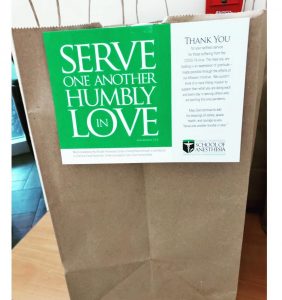 According to Colwell, Frontline Foods Nashville has raised $31,000 and provided 2,000 meals to healthcare workers in Middle Tennessee. This included the special “Cast It On” awareness campaign and donations from casts of TV shows such as “Scandal” and “Blackish.”
According to Colwell, Frontline Foods Nashville has raised $31,000 and provided 2,000 meals to healthcare workers in Middle Tennessee. This included the special “Cast It On” awareness campaign and donations from casts of TV shows such as “Scandal” and “Blackish.”
Frontline Foods conducts its efforts in partnership with World Central Kitchen, a non-profit international relief organization led by chef José Andrés.
Colwell credits her mom, Laura Colwell, and twin sister and nurse Abby Welch, for giving her encouragement while she coordinated the Frontline Foods project, as well as her fiancé and fellow classmate Payam Fathi. They plan to marry in May 2021.
President’s Message: Remaining Hopeful
Chris Hulin
DNP, MBA, CRNA
President
As we all know by now, the resilience of our frontline healthcare workers during the global pandemic has been nothing short of monumental. I have been extremely proud of those within our profession—and the many supporting them—who have been a shining example of service, strength and sacrifice.
Everyone has had to adapt to the changing landscape. Many of you have lost income or your job altogether. Our students have had to remain flexible as clinical sites worked through difficult circumstances. I’m grateful to all our clinical partners for their past dedication to our programs and to their future commitment to getting our students back on track for a meaningful educational experience.
Many who know me personally are aware of how saddened I am that our mission opportunities have been canceled or delayed. This includes planned trips to Guatemala and Guyana, which have been postponed due to the pandemic. However, I’m optimistic that we will be able to continue our work as time goes on. We will explore options for our inaugural Guatemala trip next year, and we are continuing to provide online resources for the anesthesia nursing students in Guyana over the next several months.
Our work in Haiti has been paused due to both the pandemic and social unrest, which is still ongoing. I would ask that you be prayerful for our friends in Haiti as they still have a long road ahead.
I am encouraged by the many who continue to serve locally, even as our global mission opportunities are largely put on hold. As you’ll notice in this issue of Airways, the efforts by our student Emily Colwell and the Frontline Foods organization have been multiplied by your continued support of our Mission Initiatives.
As other mission opportunities become available, we invite you to be a part of the work both locally and globally. Thank you to everyone who has been actively serving and giving during these challenging times. This too shall pass!
Learning the lessons of COVID-19
When MTSA senior DNAP student Brian Schott moved to New York City last August, he had no idea he would find himself at the epicenter of the COVID-19 outbreak.
Schott began working as a locum tenens CRNA. In January, he started a new contract at Nassau University Medical Center on Long Island, a teaching facility whose primary payer is Medicaid. As COVID-19 cases began to present in the U.S., Schott said the hospital staff had to react quickly over the course of a few weeks.
“Cases really started to pick up towards the end of February and into the first week of March. There were a lot of intubations at that time. Around March 7, we stopped doing elective cases, and hospital administrators decided our group would help manage the patients throughout the hospital because the ICUs started to fill up quickly,” he said. “Then they started taking ventilated patients on all the floors. Basically every unit became an ICU. We were intubating one to two patients every hour at its peak, with a lot of re-intubations because there wasn’t enough experienced staff to manage these patients.”
Schott added, “After we were able to educate the staff, we started doing daily rounds twice a day throughout the hospital, checking on all the patients, making sure they all had appropriate levels of sedation and paralytic. It took a couple rounds of that before staff started to catch on and understand what they needed to do. Then we started to see a drop in the re-intubations.
“The experience was beyond intense, but I learned that I’m capable of much more than I realized,” Schott said. “The hardest thing was seeing how alone patients felt because family wasn’t allowed in. I was the last person to talk with the patient before I put in their breathing tube and they were sedated.
“However, all my fellow CRNAs and my MTSA classmates were very supportive during that time. I was able to get through it and keep up with my work with their support. They would tell me, ‘You can do it. You can get through this.’ And that made a huge difference,” he said.
Schott will continue in MTSA’s dual enrollment program and is expected to graduate with his DNAP degree in 2021.
MTSA accepting applications for Alumni Grant Assistance Fund
Application Deadline: August 30, 2020
The MTSA Alumni Association Grant Assistance Fund is designed to aid, fund, and support MTSA students, workshop attendees, and alumni anesthesia practitioners emphasizing the continuing advancement of the nurse anesthesia profession. Grant funds are available in a variety of categories.
Only MTSA enrollees and workshop attendees are eligible in the following areas:
- DNAP-Practice Doctorate
- DNAP-Completion
- ASPM Fellowship
- USGRA Workshop
- Dual Enrollees
For more information, visit mtsa.edu/grant.
Grant Awardees
MTSA has chosen the following Alumni Grant Assistance Fund awardees to date in 2020:
Michael Johnson
Dual Enrollee (DNAP and ASPM Fellowship)
Amount: $3,500
Research: A Cadaveric Pilot Study: How does positive pressure ventilation affect the Erector Spinae Plane Block?
Matthew Arant
Doctor of Nurse Anesthesia Practice (DNAP) – Completion
Amount: $2,400
Research: RAPS tool assessment of USGRA competency
Patrick Myer
Doctor of Nurse Anesthesia Practice (DNAP) – Completion
Amount: $3,500
Research: Acute Surgical Pain Management: PENG block
Limited spots available for Advanced Regional Cadaveric Workshop
August session includes special PoCUS module
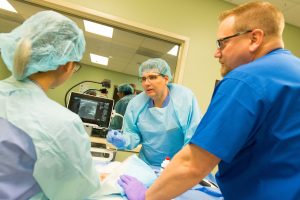 MTSA announced spots are still available at the Advanced Cadaveric Ultrasound-Guided Regional Anesthesia workshop for CRNAs on Oct. 25. The hands-on training courses utilize cadavers, “live” scanning models and state-of-the-art ultrasound technology.
MTSA announced spots are still available at the Advanced Cadaveric Ultrasound-Guided Regional Anesthesia workshop for CRNAs on Oct. 25. The hands-on training courses utilize cadavers, “live” scanning models and state-of-the-art ultrasound technology.
The August session, which will have limited class size due to COVID restrictions, will include a special workshop module on perioperative point-of-care ultrasound (PoCUS). The hands-on scanning techniques will feature Focused Assessed Transthoracic Echocardiography (FATE) exam and the Focused Assessment using Sonography for Trauma (FAST) exam, taught by John Shields, DNP, CRNA.
In addition, anatomists (trained PhDs and DPTs) will present during the lunch hour, focusing on neuromuscular assessment of nerves, mapping of nerve lesions, and documentation of these findings.
During both workshops, participants receive the benefits of small-group “live” scanning and needling stations, low faculty-to-attendee ratios, and an individualized learning plan that suits the attendee’s needs in regional anesthesia, according to Bill Johnson, DNAP, CRNA, Director of the MTSA Acute Surgical Pain Management Fellowship and DNAP Completion program. Information presented is highly practical and immediately useful to the attendee’s daily clinical practice.
Johnson said that the following blocks will be taught and demonstrated: PECs I/II, erector spinae, infraclavicular, serratus anterior, costoclavicular, RAPTIR, quadratus lumborum, TAP (iliohypogastric/ilioinguinal, transversalis, and posterior TAP), suprascapular (anterior and posterior approaches), and paravertebral nerve blocks. Advanced approaches to upper and lower extremity will also be taught, to include axillary at the circumflex artery, distal upper/lower USGRA blocks, and anterior sciatic.
Instructors for the daylong workshop include Johnson; Stace Dollar, MS, CRNA; John M. Edwards, III, MS, CRNA; Kelly Martin, MS, CRNA; and MTSA Acute Surgical Pain Management Fellows.
Participants can earn up to 16 Class A CE credits by completing the pre-course content and the course content combined. In addition, the AANA designates this program as meeting the criteria for up to 2 CE Credits in pharmacology/therapeutics.
Registration is available at www.mtsa.edu/workshops. For more information contact Bill Johnson at (615) 732-7846 or bill.johnson@mtsa.edu.
AANA Journal publishes article by Leigh Taylor
Leigh Taylor, DNP, MS, CRNA
MTSA Assistant Program Administrator
The AANA Journal has published an article by MTSA Assistant Program Administrator Leigh Taylor, DNP, MS, CRNA, in its June issue. Substance Abuse and Misuse Identification and Prevention: An Evidence-Based Protocol for CRNAs in the Workplace focuses on combating substance use disorder among anesthesia providers.
The idea for Taylor’s research came from her experience with a close friend and healthcare worker who attempted suicide. Taylor recognized that CRNAs spend considerable time and energy caring for patients and that, oftentimes, they don’t have the resources or ability for self-care. She said these were the concerns that informed much of her doctoral work.
“In the anesthesia community, we have a very high incidence of substance use disorder,” Taylor said. “There are many theories about why: The drugs are accessible in the workplace; providers work alone without supervision; the work environment is high-stress with little attention on coping skills to manage the stress and long hours.”
According to Taylor, the most recent statistics showed that one in 10 anesthesia providers has a substance use disorder, and that the incidence is becoming more prevalent in providers who have been in the field less than five years. “That data is disturbing to me. Those are my students,” she said.
Taylor said she began to question why there wasn’t more action being taken in the workplace to prevent this issue, which is what led her to conduct the research and write the article.
Part of her research included best practices and data from the U.S. Department of Transportation—which she said also has a large incidence of substance use disorder—Substance and Mental Health Services Administration, National Institute of Drug Abuse, and similar agencies in other countries.
From that research, Taylor created a workplace protocol that has eight components to help early-identify and prevent substance abuse and misuse for CRNAs in the workplace. She said her hope for those reading the article is to decrease the stigma and shame associated with substance use disorder and to provide an evidence-based approach for anesthesia groups or departments to implement protocols for prevention and identification.
“When I presented this research at the AANA Conference last summer, many who walked by would say, ‘We need these protocols in our workplace.’ We all know someone who has been affected by this issue,” Taylor said.
She added, “I feel very passionate about this. I feel that our own wellness is something we don’t focus enough on, even though it’s a primary focus with our patients. But we can do better. If we can help CRNAs take better care of themselves, then we might be able to decrease the incidence of substance use disorder that afflicts our anesthesia community.”
In addition to her role as Assistance Program Administrator at MTSA, Taylor is a CRNA with AMG and practices at Saint Thomas West Hospital in Nashville. She is in the process of completing the AANA’s training to become a peer wellness advisor, a role that provides assistance to CRNAs who are experiencing a crisis. The AANA Peer Assistance Helpline is available by calling (800) 654-5167.
Taylor earned her master’s degree in nurse anesthesia at MTSA, graduating in 2013. She said she couldn’t have finished her doctorate without the help of her husband Chris Janowiecki, along with her parents. She added that the drive for more education was to set an example for her daughters, Elliot (4) and Holland (2). Taylor and her husband also have a son, Wells, who was born in January.
Application period for Acute Surgical Pain Management Fellowship now open
Enhanced curriculum includes POCUS, ERAS
Bill Johnson, DNAP, CRNA
John Shields, DNP, CRNA
MTSA is accepting applications for the next cohort of the Acute Surgical Pain Management (ASPM) Fellowship, announced Bill Johnson, DNAP, CRNA, Director of the Fellowship and DNAP Completion program. The application period closes Nov. 30, and classes begin in January 2021.
The objective of the ASPM Fellowship, a component of the AANA Pain Management Curriculum, is to advance the knowledge and skills of CRNAs in acute surgical pain management and prepare them to help meet the growing need for this evidence-based approach. This includes special focus on perioperative point-of-care ultrasound (PoCUS) hands-on scanning techniques, Johnson said.
“Each faculty member within MTSA’s ASPM Fellowship has a defined area of focus and is an expert in that portion of the Fellowship curriculum,” Johnson added. “This includes research anatomists, pain physiologist, physical therapists, pharmacologist, and clinicians.”
POCUS refers to the use of portable ultrasonography at a patient’s bedside for diagnostic and therapeutic purposes. Along with its use for pain management, heart, lung and abdominal scanning may reveal sources of hypotension, hypoxemia and other presentations of cardiopulmonary instability, according to module instructor John Shields, DNP, CRNA.
“As POCUS is a major component of perioperative care, this training is vital to independent CRNAs practicing to the full scope of their training. In preparing CRNAs for advanced independent practice, MTSA’s ASPM Fellowship is representative of this trend. To this end advanced POCUS training for nurse anesthetists will be incorporated into online modules and hands-on workshops for Focused Assessed Transthoracic Echocardiography (FATE), Focused Assessment using Sonography for Trauma (FAST) and Rapid Ultrasound for Shock and Hypotension (RUSH) protocols,” Shields said.
Faculty Focus: Desirée Chappell
Desirée Chappell, CRNA
A recent addition to the ASPM Fellowship faculty is Desirée Chappell, CRNA. Based in Louisville, Ky., she teaches the enhanced recovery after surgery (ERAS) modules, which recently were expanded to cover a wider range of clinical applications for CRNAs. She also serves as Managing Editor for the TopMedTalk podcast and has just accepted a new position with NorthStar Anesthesia.
Following are excerpts from a recent conversation with Chappell regarding her background and expertise:
Airways: Tell us about your career path and what eventually led you to MTSA.
Chappell: I’m a CRNA by training. I decided to leave full-time clinical practice in 2018 to pursue some professional development outside the world of clinical anesthesia and into the world of podcasting as well as education and consulting. This includes educational leadership related to enhanced recovery after surgery (ERAS), which is a quality initiative program that started in Europe almost 20 years ago and has grown more prevalent in the U.S. in the last five to eight years. I chose this route because I had helped launch a successful enhanced recovery program at Norton Audubon Hospital in Louisville.
Airways: How did your work in enhanced recovery grow from there?
Chappell: At Norton we saw the benefits very early on of engaging with and implementing this quality improvement program. I was very passionate about it, and I soon became involved with national organizations such as the American Society for Enhanced Recovery—where I was the first CRNA on the board—and Evidence Based Perioperative Medicine (EBPOM), for which I’m a co-director.
Airways: You also do podcasting. How did that come about?
Chappell: I started speaking internationally about enhanced recovery, and when I was presented with the opportunity to join a podcast on this subject, I decided to take the leap! Our TopMedTalk podcast has been running for two-and-a-half years, with more than 800 episodes logged. It focuses on perioperative medicine and has become a great educational resource for many people in our space.
Airways: How did you become connected with MTSA?
Chappell: I met MTSA President Chris Hulin and Fellowship Director Bill Johnson a few years ago and had some discussions about my work in enhanced recovery and the fact that CRNAs had an opportunity to lead outside of their traditional scope of delivering anesthesia. In fact, it fit very well with acute pain management because it utilizes evidence-based principles that contribute to the reduction of opioids in the OR.
Airways: What synergies exist between ERAS and pain management?
Chappell: Enhanced recovery after surgery is a quality improvement initiative that focuses on the care of the perioperative patients through the continuum of care. It isn’t just one intervention that an anesthesia provider uses during surgery. It is a synergistic, multi-disciplinary approach to care that can significantly improve outcomes for the patient. It reduces length of stay and complications, and it improves patient satisfaction and quality of care.
Airways: Tell us about the recent expansion of ERAS curriculum with the Fellowship.
Chappell: Originally in the Fellowship, ERAS was covered at a basic level with one or two lectures. As time went on, it became clear that enhanced recovery started to take hold within the broader clinical setting, so CRNAs were coming to the Fellowship with a little more background. That led to creating a more robust enhanced recovery curriculum because a CRNA is now more than likely going to be working with an enhanced recovery team and have the opportunity to add value to their own practice as well as the group practice.
Airways: What drives your passion about ERAS and expanding CRNAs’ scope of practice?
Chappell: One reason why I’m so passionate about this particular initiative, as well as perioperative medicine as a whole, is that now is the time as CRNAs to take on more leadership. Our scope of practice is expanding across the U.S. There are many CRNA-only practices as well as more CRNA autonomy within practices, so we have an opportunity to apply this knowledge and change outcomes for patients, which is really our ultimate goal and why we’re there. In addition, this enables CRNAs to go back to their group and the hospital to show the value-add for patients. It reduces cost for the hospital, and it improves quality of care. So it’s a win-win.
For more information about the ASPM Fellowship, visit. www.mtsa.edu/fellowship.
MTSA approved for CARES Act funding
MTSA was approved for $56,794 in federal funding from the CARES Act (H.R. 748), which provides emergency relief funds to organizations and individuals affected by the coronavirus pandemic.
Half of the funding will be used specifically for student assistance as a result of the COVID-19 pandemic. The other half is an institutional share and can also be used for student assistance.
According to the U.S. Department of Education, the CARES Act Higher Education Emergency Relief Fund-IHE/Student Aid provides funding to institutions to provide emergency financial aid grants to students whose lives have been disrupted, many of whom are facing financial challenges and struggling to make ends meet. Students should contact their institutions for further information and guidance. Institutions have the responsibility of determining how grants will be distributed to students, how the amount of each student grant is calculated, and the development of any instructions or directions that are provided to students about the grant.
Eligible MTSA students may apply for funds under the CARES Act by visiting mtsa.edu/CARESAct, which includes FAQs and instructions.
MTSA’s Fall Events Registration Open
17th Annual MTSA Golf Classic
Thursday, Sept. 17
Hermitage Golf Course
Benefitting MTSA’s Mission Initiatives in Guyana and local communities.
4th Annual MTSA Sporting Clay Tournament
Friday, Nov. 6
Location: To Be Announced
Benefitting MTSA’s opioid-reduction initiative.
For more information, visit www.mtsa.edu/events or call (615) 732-7674.
Graduation Ceremony for DNAP Completion students
Sunday, Aug. 23
2 p.m.
MTSA Doctor of Nurse Anesthesia Practice completion degree students only will celebrate graduation on August 23, 2020. The event will be held at the Noah Liff Opera Center located at 3622 Redmon Street, Nashville, Tennessee. It will also be streamed live online.
Please note: Due to COVID-19 restrictions, in-person attendance will have limited capacity. Visit mtsa.edu/graduation for additional details.
From the Archives: A Piece of History
MTSA Founder and Program Administrator Bernard V. Bowen, CRNA, traveled the world extensively teaching and providing anesthesia care in a variety of hospitals and mission clinics. He is pictured here in an Asian operating room giving anesthesia. One of the hospital workers with whom he worked is also pictured. Mr. Bowen’s legacy of service and mission is still a primary focus at MTSA today as the School has served in several Nashville communities, and also abroad in locations like Haiti and Guyana.


